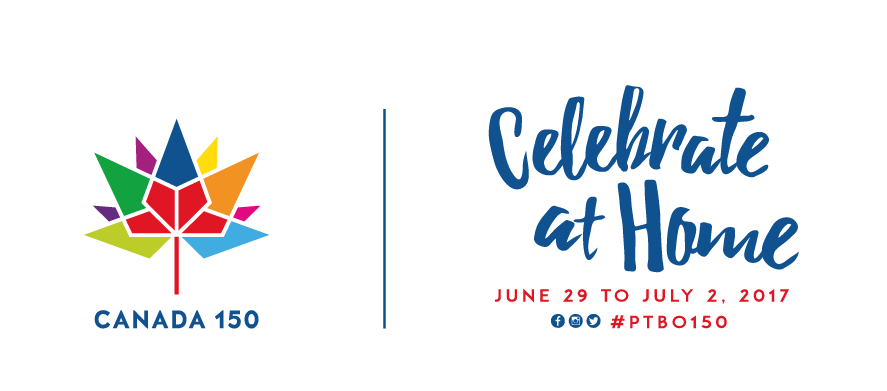-
SERVING THE ARTS COMMUNITY
IN PETERBOROUGH AND
PETERBOROUGH COUNTYEC3 IS HIRING AN ASSOCIATE PRODUCER FOR ARTSWEEK 2025
-
SERVING THE ARTS COMMUNITY
IN PETERBOROUGH AND
PETERBOROUGH COUNTYApplications Open for Grants for Individual Artists 2025
-
SERVING THE ARTS COMMUNITY
IN PETERBOROUGH AND
PETERBOROUGH COUNTYPoets of Nogojiwanong
-
SERVING THE ARTS COMMUNITY
IN PETERBOROUGH AND
PETERBOROUGH COUNTYBierk Art Bursary Program 2026: Coming Soon
-
SERVING THE ARTS COMMUNITY
IN PETERBOROUGH AND
PETERBOROUGH COUNTYPeterborough Poet Laureate Nominations Open
-
SERVING THE ARTS COMMUNITY
IN PETERBOROUGH AND
PETERBOROUGH COUNTYWatch "February" by Peterborough Poet Laureate Ziysah
-
SERVING THE ARTS COMMUNITY
IN PETERBOROUGH AND
PETERBOROUGH COUNTYBlack History Month: Events and Resources
-
SERVING THE ARTS COMMUNITY
IN PETERBOROUGH AND
PETERBOROUGH COUNTYNational Poetry Month 2023 Video Series
-
SERVING THE ARTS COMMUNITY
IN PETERBOROUGH AND
PETERBOROUGH COUNTYWorkshop Recording: Tax Time for Artists
-
SERVING THE ARTS COMMUNITY
IN PETERBOROUGH AND
PETERBOROUGH COUNTYSpotlight on Local Black Artists
-
SERVING THE ARTS COMMUNITY
IN PETERBOROUGH AND
PETERBOROUGH COUNTYArt of Inclusion: Relaxed Performances
-
SERVING THE ARTS COMMUNITY
IN PETERBOROUGH AND
PETERBOROUGH COUNTYWatch EC3's 2022 Video, "Support Artists!"
-
SERVING THE ARTS COMMUNITY
IN PETERBOROUGH AND
PETERBOROUGH COUNTYInvesting In The Arts
-
SERVING THE ARTS COMMUNITY
IN PETERBOROUGH AND
PETERBOROUGH COUNTYA Vibrant arts community
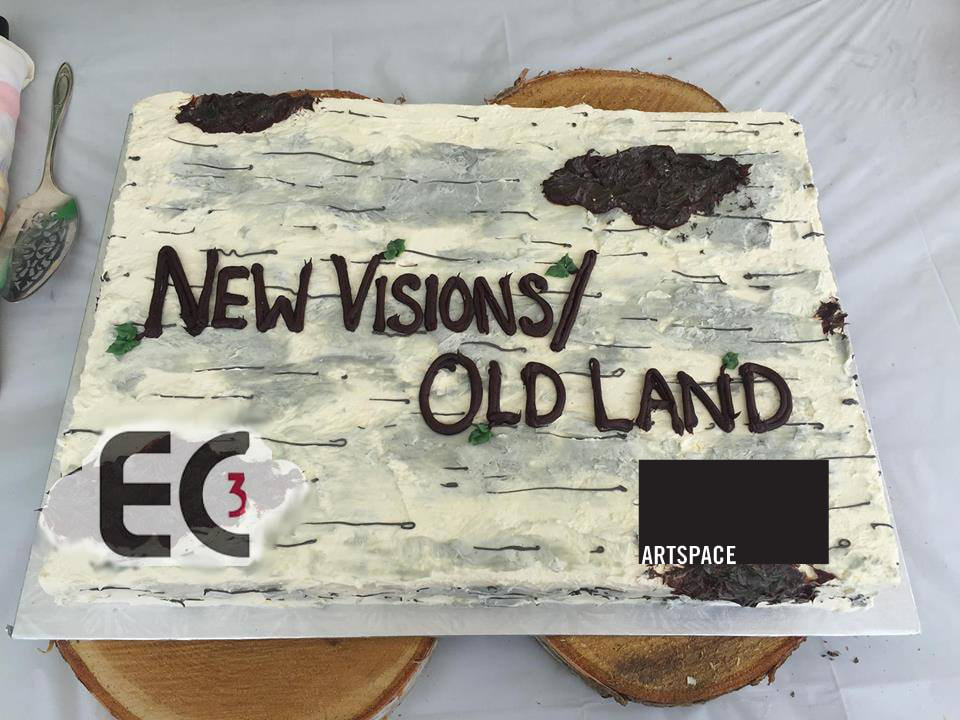
New Visions / Old Land Introduction
by Su Ditta, Executive Director EC3
Cities all across Canada developed elaborate celebrations this year (2017) to mark the 150th Anniversary of Canadian Confederation. “Canada 150” projects and festivities erupted throughout the land and millions and millions of dollars flowed from public and private sources alike to support them. Everything from giant rubber duckies on Lake Ontario to a series of remarkable public art projects organized by Parks Canada marked the occasion. Peterborough was no exception. A committee was formed, funds were set aside, hard work ensued and several programs of music, parades, face painting, dancing and other activities were organized over three days in and around July 1st – Canada Day.
The Electric City Culture Council (EC3), Peterborough’s municipal arts, culture and heritage service organization, was asked to participate. City funding was provided and our assignment was to include local artists in the celebration and to “animate” a particular part of Hunter St. West in the city’s downtown core. This was an opportunity for local artists to bring their skills and imagination to the complex issues swirling around Canada 150 in the cultural community and beyond, and for audiences to experience art in a very different way.
Our project: New Visions/Old Land, was organized in partnership with Artspace (Peterborough’s outstanding artist-run centre) and we commissioned four new media arts (film/video) works by local artists. Trent University Cultural Studies professor and experimental filmmaker Kelly Egan was hired to curate a site-specific exhibition on Hunter St. W. and the result was an astonishingly creative, immersive environment of four dedicated pop-up theatres and store front installations, a live broadcast centre (Trent Radio) and a cameraless filmmaking workshop.
The framework for the commissions required that the works be no more than 5 minutes in length, be silent, and be accompanied by live musical or audio soundscapes. As the call for proposals indicated, the works were to provide a critical perspective on Canada 150 and open up new ways of knowing and understanding the histories that framed the 2017 celebrations.
On June 30th 2017, torrential rains beat down on Peterborough, but the artists, curator, production crew and volunteers persisted. The storm broke, the sun shone and New/Visions/ Old Land attracted hundreds of people.
It was such a success, that we thought it should have an extended life and some legacy value and so we bring you this on-line publication with a curatorial essay by Kelly Egan and statements, descriptions and bios for all of the artists and works included in the exhibition. New Visions/Old Land Reprise: Troubling Canada 150 on September 30th at Traill College/Trent University brought together another public screening of this work, a panel discussion and the launch of this publication, a podcast and a dedicated YouTube channel.
EC3 would like to extend our heartfelt thanks and deep appreciation to all of the artists involved, the curator, to our funders and partners (including several Hunter St. stores and businesses), to Artspace, Traill College, UNAVOX, Trent Radio, Peterborough Independent Podcasters, Public Energy and the entire NV/OL team for making all of this possible. There is a full list at the end of this publication. Canada 150 should give us all serious food for thought. Please take a bite of our cake.
New Visions / Old Land Curatorial Statement
by Kelly Egan
This year (2017) marks the 150th anniversary of Canadian confederation. However, the land and the people who inhabit this land have been here much longer. This has been the guiding principle of the New Visions / Old Landmedia arts commission and exhibition organized by the Electric City Culture Council (EC3) in partnership with Artspace. The history of this nation has often been shared through a celebration of our history, our culture, and our arts. For New Visions / Old Land, we wanted to look forward, to a potential future built on the foundation of our past. In the Call for Proposals, we asked: “How can we trace an outline of the future in the fragments of the past? How can we represent this fixed geographical place and our collective cultural and social space? What histories have remained hidden, and how can we bring them to light, recasting the past, and inventing alternative futures?”
Past, present, and future meet in the four media artworks commissioned from local artists for New Visions / Old Land, each voicing a unique perspective on the idea of “Canada.” For the organizing committee and the curator ofNew Visions / Old Land, the ingenuity and originality of these four artworks help to evoke a pluralistic new vision of the Canadian landscape, which speaks not only to the significance, but also to the potential, of this old land and its diverse people.
Why focus specifically on the Canadian landscape? From Joyce Wieland’s Reason Over Passion (1969) to Alexandre Larose’s Brouillard (2014), Canadian landscape is perhaps one of the most pervasive themes in Canadian experimental film and video. The works commissioned for New Visions / Old Land speak to this tradition with fresh voices, using new forms of storytelling and technological innovation. These new voices challenge colonial, often Eurocentric, and overly romantic ideas about the Canadian landscape, situating this historical approach within the contemporary political, economic, and environmental context. The four video/film pieces in New Visions / Old Landeach specifically add to thematic of landscape by, on one hand, probing the ways we know the land, how this relates to our experience of life, and what this points to about our knowledge systems in general, and, on the other, considering how our relationship to the land is mediated by technology and how we document our world. All four works reflect on epistemological systems, and, I would argue, ask us to think about dominant forms of knowledge production, dissemination, and reception. Together, these four works ask us to contemplate the material affects of representations through structural critique and aesthetic interaction.
Knowledge production, meaning, and representation are candidly addressed in Joeann Argue and Cara Mumford’s installation I Remember... Stories from a 500-Year-Old Tree. This work considers the hierarchy of form by challenging the dominant paradigm of information communication: Argue and Mumford use storytelling as a methodology that inherently questions the hegemony of Western epistemology—by juxtaposing a personal narrative against the assumed objective documentation of “facts.” From the perspective of a 500-year-old tree, the 150th anniversary of Canadian Confederation represents only a fraction of her life experience; the ideology normalized in Western institutions thus can be understood as alternative, fragmenting and oppressive. This tree, born on Michi Saagiig territory, speaks through a natural communication network made up of electrical impulses, biochemical reactions, and ground cover. She lives by the natural cycles of the seasons. She is wise, but we don’t always listen. The story of this tree differs from the tale told in history books. In telling the tree’s story, Argue and Mumford offer a much-needed indigenous voice to the canon of Canadian landscape film—the voice of the land itself.
Shannon Taylor was similarly interested in knowledge systems emanating from our experience of the land, with the implicit desire for a more ecologically conscious future. Her video Land looks at the ways in which our relationship with the land and nature has been framed through archival documentation, often through a Eurocentric lens. Taylor attempted to work with photographic images that were not staged, that focused on the human interactions in nature: farming, fishing, hunting, and travelling. For Taylor, the archival photographs were often problematic examples of representation of a colonial history, as the images contained cultural appropriation, stereotyping, and/or oppression. Implicit within these images exists a visual history of the problems of authenticity and power in cultural representations. Taylor’s video points to power relations within the mythology that becomes cultural memory. Weaving together archival images with present day footage, Land redirects representations from the Eurocentric gaze to the Canadian landscape itself, and asks us to question the hegemony of Western epistemology by considering how its teachings have guided our actions with/on this land.
Starting from a similar interest in the ways in which we cultivate the land, Meagan Christou’s film Boerner Dividertakes on the complex story of the agriculture industry in Canada. Formally framed and visually stunning, Christou’s film balances the idea of the agriculture industry as a sociopolitical and economic driver that sometimes normalizes violent practices against the land with the more personal side of farm life. As a local grain-worker, Christou marries her first-hand experience with the agricultural machinery with her technical understanding of the photochemical arts. Her film installation serves to ground the conceptual framework of the film: the perpetual degradation of the film emulsion (scratches, dirt, marks) generated from the journey of the filmstrip through the projector and looper, is meant to symbolize the ways in which we relentlessly impose ourselves onto nature, often in a violent and mechanical manner. This aestheticization of the mechanical element of film serves as a larger political statement: that our ideological practices have real, material effects. In this regard, Christou’s installation challenges the viewer to confront the hegemonic practices within our current agricultural paradigm.
Kerri Kennedy’s three-channel video also probes questions of technological engagement with the land. Rather than the mechanical, Time-Scape asks us to consider the digital moment where photography and recorded documentation is facilitated by the ubiquity of digital technology (for example, through smartphones and social media platforms). The digital moment has been envisioned as ephemeral, instantaneous, and global. However, our idea of the digital can be thought of as having a temporal misalignment with its material footprint. Our digital technology is not without ecological impact, as many of the components needed for the computers in everything from our smartphones to toasters are mined from the land. And, in our disposable society, when returned to the land, in our dumps and landfills, these components are far from ephemeral—polluting our land with hazardous waste. Kennedy uses the production-reproduction cycle of a video image to mark the material space of digital representations, and, in the process, draws our attention to the materiality of digital representations in general. The tension between the supposedly realistic representations of the local landscape against the oversaturation produced by extending the digital noise of the digital reproduction process creates an aesthetic experience that demands that the viewer reexamine the modernist idea of representation. Kennedy’s images are visceral, and seduce us into an experiential and cognitive understanding of the work.
Together, these four projects offer unique voices regarding the cultural experience of this land, voices that speak to the complexity of an evolving identity. Whether personal or political, anniversaries often mask or repress the intricacies of a story; the 150th anniversary of Canadian confederation in 2017 is no different. While this anniversary is primarily legal/political, it also marks the promise of the development of a nation built on the ideals of peace, order and good governance. Unfortunately, these privileges emerge from a violent, racist, and discomforting story that should not be marginalized or forgotten. Without ignoring our past, the artists commissioned for New Visions / Old Land pushed forward, creating both aesthetically provocative and politically aware pieces that inspire audiences to think critically about the dominant ideology that surrounds us, and that allow us to reconsider the place of the land in the story of Canadian identity.
Dr. Kelly Egan is an Assistant Professor in Visual and Media Studies within
the Cultural Studies Department at Trent University.

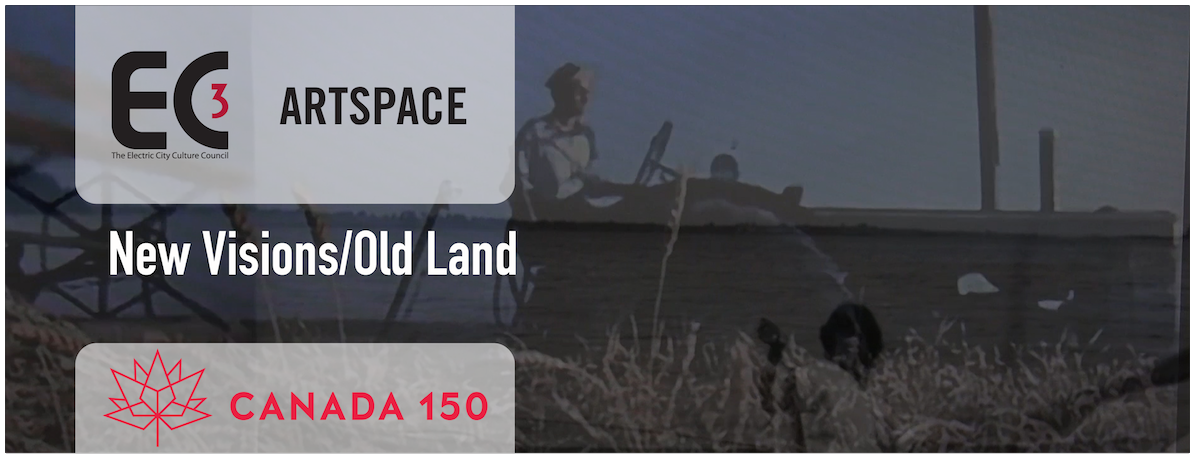
Land
Shannon Taylor / 2017 / 5 min. / Digital Video / Silent with live sound by Benj Rowland
Summary:
This project combines archival footage and contemporary documentation to create a visual poem that demonstrates our complex relationship with our natural environment. How can we imagine our future relationship with the natural environment when confronted with our past?
Artist Statement:
Land is a montage of historical images documenting people working and living close to the land, overlaid with footage of the natural setting around Peterborough, Ontario. I wanted to make reference to the history of hunting, fishing, harvesting, and working the land (specifically the canoe builders, the farmers, and labourers), while also pointing to more contemporary, ecologically conscious practices. Canada is composed of vast expanses of land and water, and this video highlights some of the ways these natural resources have shaped our social and economic activities, and shows the interdependency between people living in small communities and large cities.
In more recent history, colonization, corporate farming, migration, technology, and mechanization have seemingly separated people from the land and from sustainable ways of living. Globally, the planet has experienced massive destruction of essential land and water resources through industry and overconsumption. Yet the wisdom of living simply and more sustainably is once more being recognized by many as the way of the future. It is my hope that in the future, globally, we will move further in this direction. It would be wonderful to someday see Canada become a leader in environmental stewardship through sustainable energy, farming, and building practices, and to
re-engage with ways of knowing that are closely related to the diverse lands that foster our lives.
Biographies:
Shannon Taylor received her Bachelor of Fine Arts from the Nova Scotia College of Art and Design (NSCAD), graduating with a major in Media Arts in 2002. At NSCAD, she won the Gordon Parsons Scholarship and the Media Arts Award. She has also received the Gadfly Prize from Trent University and grants from the Ontario Arts Council. Having an avid interest in pattern and design, Shannon has painted murals throughout Peterborough, including those that adorn the walls of downtown Peterborough’s Café District. You can find also Shannon’s work at the Art Gallery of Peterborough and Christensen Fine Art.
Benj Rowland is a singer, songwriter, and accomplished multi-instrumentalist. He is the lead singer of the Mayhemingways, a Peterborough-based duo, described as eclectic and original, with roots in the tradition of dark North American folk. Benj has toured extensively across Canada, and recently returned from a tour promoting the Mayhemingways’ latest album Hunter St. Blues. When not touring, he may be found playing at the Peterborough Farmer’s Market or enjoying what the local music scene has to offer.

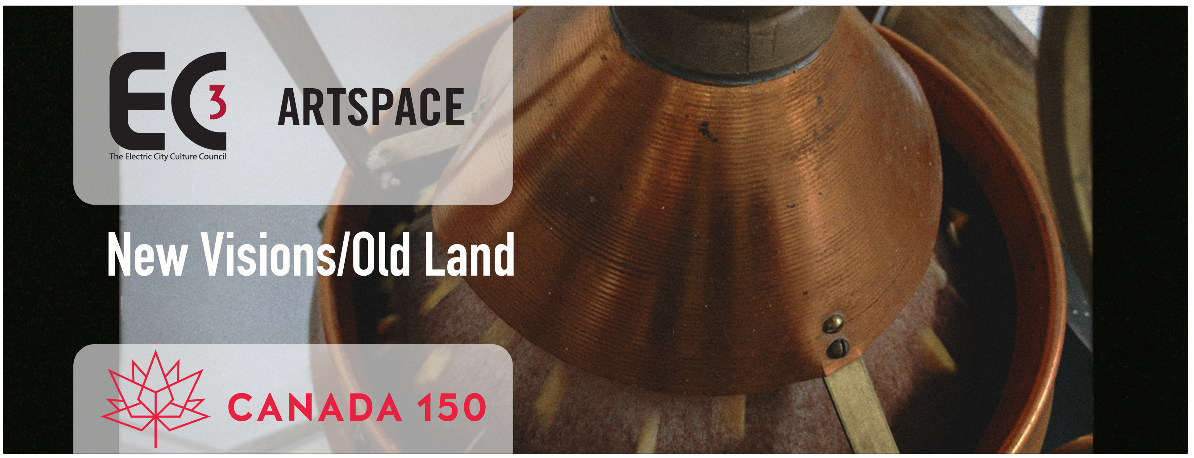
Boerner Divider
Meagan Christou / 2017 / 5 min. / 16mm Film / Silent with live sound by Andrew Savery-Whiteway
Summary:
This film explores issues of nature, colonialism, and class through a conceptual platform: the perpetual degradation of the film emulsion (scratches, dirt, marks) generated through the act of continuous projection is meant to symbolize ways we relentlessly impose ourselves onto nature, often in violent and mechanical ways. How does the capitalist ideal that “progress is our most important product” affect our land and our being?
Artist Statement:
For the past year, I have been working the land. Within huge silos, four men and I processed hundreds upon thousands of acres of grain; we sweat and bled to clean, sort, and store it. Inside these silos, we transformed nature into commerce, the land’s bounty into money. Although through farming we can nurture, I felt a violence, a chain of violence, not only from me towards the land, but of the labour on our bodies. If Canada is 150 years old for a settler, how have rural colonists changed and shaped this land? The film and installation Boerner Divider explores these issues of nature, colonialism, and class. Shot in the Kawartha Lakes and Peterborough region, the film captures not only the industrial agricultural complex, but the people and families that farm and the landscape they have changed. As this footage travels through the projector and repeats the images continuously through a transparent looper, we witness the topography of the film degrading and the mechanical impositions on the images.
Boerner Divider is accompanied by a live escalating sound collage composed by Andrew Savery-Whiteway. Using an analog sampler, ¼” reel-to-reel tape recorder, and two vinyl record players, Savery-Whiteway takes small samples from spoken word, soundscape, and classic Canadian country LPs, gradually layering one over another to produce an arrangement of sounds reflecting the environmental noise that is present in industrial agricultural facilities and farms alike. Then, using the reel-to-reel recorder with a tape loop, the sounds are reduced to a low-pitched sub-bass feedback loop drone, ultimately building a new sound collage over top of the drone.
Biographies:
Meagan Christou is an emerging artist who works with photography, video, installation, and performance. She received her Bachelor of Fine Arts in Photography from Ryerson University in 2016. At Ryerson, her film installation, Lamentations, won Best in Show at Maximum Exposure in 2015, and her photograph, Faith, won Best in Show at Full Frame in 2014. Since graduating, her photography and film-based installations have been shown at the Toronto Photographers Workshop (TPW) and the Ryerson Artspace at the Gladstone Hotel. She lives on a farm in Mount Pleasant, Ontario.
Andrew Savery-Whiteway is a photographer, video artist, and jazz musician from Trenton, Ontario. He received his Bachelor of Fine Arts in Photography from Ryerson University in 2016. Since graduating, he has collaborated with visual artist Max Dean, and worked as a studio assistant to several Toronto-based visual artists and photographers. Andrew continues his art practice out of astudio based in the distillery district in Toronto.

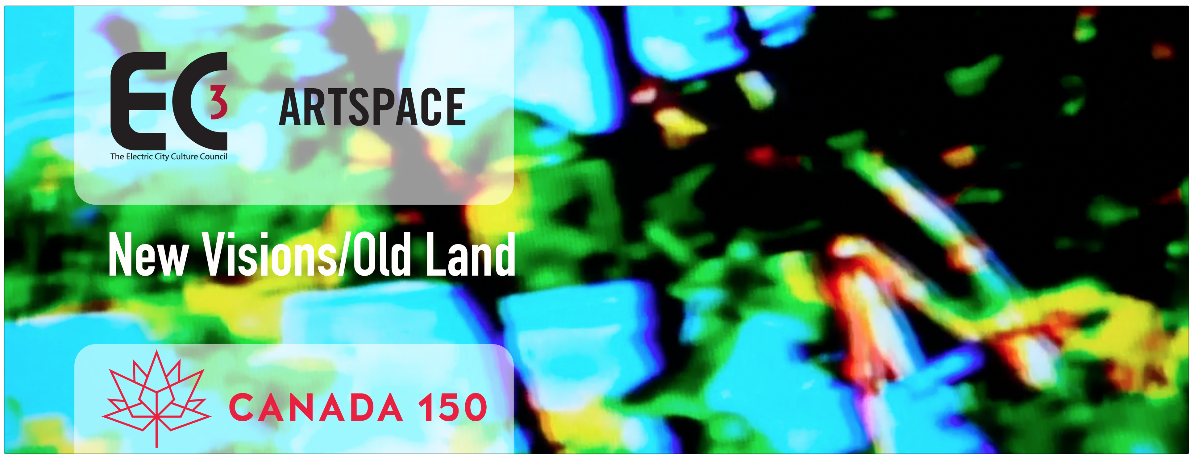
Time-Scape
Kerri Kennedy / 2017 / 5 min. / Digital Video / Silent with live sound by Jake Ryan
Summary:
This three-channel video installation asks us to think about ideas of representation, materiality, and history through technological distortion. How do time and digital media abstract the image of the Canadian landscape?
Artist Statement:
Time-Scape, a three-channel video project, sets out to problematize the idea of Canada 150 through the exploration of what I call a “constructed temporality.” This anniversary, while convenient and well-intentioned, suggests that the people and land before confederation are insignificant. I wanted to engage with the landscape, to reconsider the place onto which the idea of “Canada” has been built. In addition to this, my piece attempts to challenge the perceived capabilities of the video and digital format while simultaneously exploring the natural landscape of Canada from a new perspective. Time-Scape brings together an investigation of the old “landscapes” of the Peterborough region with the consideration of new digital conceptions of materiality and time. Digital video, as a medium, challenges the linear structures of time because it allows you to experience the past in the present while offering the possibility of experiencing this past again in the future. Through experimentation with the material structures of digital video, Time-Scape re-presents the temporal shifts possible with the medium. The audience sees a new vision of the
Peterborough landscapes, only possible through the digital mediation of recorded content. Time-Scape allows the audience to experience not only the video representation of a natural landscape, but also the temporal effect of the mediation possible through the digital landscape. The live sound accompaniment, created by local musician Jacob Ryan, will further reinforce these ideas of temporality. The visual landscapes will be represented as soundscapes utilizing samples of sounds from the natural land, which are then transformed and become distorted to the extent that they become significantly removed from their original context just as the visual components distort over time.
Biographies:
Kerri Kennedy is an emerging interdisciplinary artist, specializing in visual, media and performance arts from Peterborough, Ontario. In 2017, Kerri received a Bachelor of Arts (Honours) in Cultural Studies from Trent University, where she specialized in Image, Sound and Performance, with an emphasis in Theatre Studies. Her work explores innovative and untraditional approaches to old and new media, specifically with combining different modes of production in hybrid forms. Kerri’s work has been screened at Trent Film Society’s Snowdance: Short Film Festival, where her video Digital Landscape was awarded Best Experimental Film in 2016.
Jacob Ryan is a Peterborough-based musician and member of the improvisational ensemble Perkolator. Their past work includes compositions of process music for group performance, as well as sample-based electronic music. Additionally, they regularly perform live both as a solo artist and as the bassist for Prime Junk.

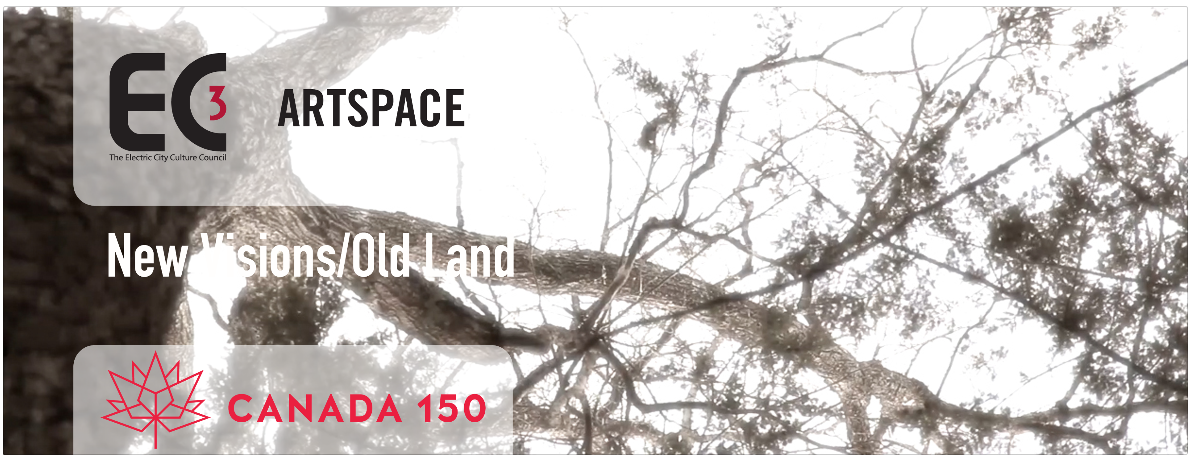
I Remember... Stories from a 500-Year-Old Tree
Joeann Argue and Cara Mumford / 2017 / 5 min. / Digital Video / Spoken word and
recorded sound by Joeann Argue, live sound by Nick Ferrio
Summary:
This installation tells the story of Michi Saagiig territory from the perspective of a grandmother tree who began her life in the territory long before the arrival of European settlers, who brought with them a need to dominate the “new world”, primarily through the erasure of ancient lands and cultures. What does “Canada 150” mean when the wisdom of and from the land is ignored in favour of a Eurocentric hegemony that asserts dominance at all costs?
Artist Statement:
I Remember… is a 5-minute video of the oldest maple tree in Peterborough through the seasons. This grandmother tree was growing in Michi Saagiig territory long before the coming of Europeans and colonization. She retains her memory of the time before industrialization, before roads and buildings, before people began to turn their backs on nature and forget the wisdom that the earth provides. Despite her advanced age – which is only advanced in human terms but barely out of youth in tree terms – she continues to provide the sap that nourishes humans and animals alike after a long, cold winter. Through that sap, she passes knowledge of the land and of creation, to anyone who is willing to hear.
Accompanying the video is a vocal and instrumental soundscape, which gives voice to the tree and all that she has seen in her life. The effect of this soundscape is that of the murmuring of the forest, those sounds that we hear but often do not listen to as we go about our days. The Anishnaabeg in the past could understand and communicate with the trees and the trees, as scientists have finally begun to understand, communicate with one another. The film and soundscape ask the audience to take some time and listen to their relatives, to listen to the stories of the oldest tree in this corner of the world. The old tree knows of times before many of your ancestors even stepped foot on this (new) old land. I Remember… asks you to listen, to hear the stories that, even if you don’t understand now, will lodge in your heart and mind and send you out into the world to listen to your relatives tell of the wisdom of the land.
Biographies:
Joeann Argue is a musician, sculptor, bead worker, photographer, and an instructor in the Indigenous Performance Program at Trent University. She received an MFA from the Vermont College of Fine Arts in 2015, focusing on sculpture, performance art, and installation. She is one of the members of Unity, an Indigenous women’s singing ensemble whose original music was featured at the Peterborough Symphony’s 50th anniversary concert in February 2017. Joeann has been writing and performing music for almost twenty years and has recently begun working in sound sculpture. Her installation for Erring on the Mount in 2015 was an immersive sound piece. Joeann is collaborating with Cara Mumford on the Red Card web project.
Cara Mumford (Métis / Chippewa Cree) is a filmmaker, writer, and collaborative artist from Alberta, living in Peterborough, Ontario since 2010. Since becoming a filmmaker in 2006, Cara’s short films have screened regularly at the imagineNATIVE Film + Media Arts Festival in Toronto, and toured throughout Australia and internationally with the World of Women Film Festival. Her short film, Echoes, won Best Underground Film at Chashama Film Festival in New York City in 2009. Her short screenplay, Ask Alice, won Best Short Script at the Los Angeles Women’s International Film Festival in 2011 and her spoken word dance film, December 6, continues to be screened every year at Montreal Massacre memorials across Canada. Cara recently won the NFB/imagineNATIVE Interactive Prize to create a website for her Indigenous futuristic Red Card world.
Nick Ferrio is a musician and songwriter. Since 2009, he has written and performed under his own name, releasing the albums Introducing His Feelings (2012, Shuffling Feet Records), Half the Time (2013, 7th Fire Records), and Amongst the Coyotes and Birdsongs (2015, Headless Owl Records and BB Island Records). He has performed at concerts and festivals across Canada and Europe, including appearances at POP Montreal, Halifax Pop Explosion, CMW, NXNE, Sappyfest (Sackville, NB), Dawson City Music Festival (Dawson City, YK), Lawnya Vawnya (St. John’s, NL), In the Dead of Winter (Halifax, NS), and Hillside Music Festival (Guelph, ON). Ferrio is a member of The Burning Hell and has performed and contributed to the albums Happy Birthday (2008, weework Records), Baby (2009, (weewerk) Records), People (2013, BB Island Records), and Public Library (2016, BB Island Records). He also performs with Leanne Betasamosake Simpson and contributed to her album Islands of Decolonial Love (2013, ARP Books) and (f)light (2016 RPM Records).
New Visions/Old Land 2017
An EC3 and Artspace Canada 150 Partnership Project
Acknowledgements
EC3 and Artspace would like to extend our sincere thanks and appreciation to our Partners, Volunteers, Sponsors and Funders for their generous suppagp.on.ca/ort of New Visions/Old Land…
The New Visions/Old Land Team:
EC3 Executive Director: Su Ditta
NV/OL Curator: Kelly Egan (Trent University)
Technical Director: Steve Rose (UNAVOX)
Technical Support: Bill Kimball (Public Energy), Jon Lockyer (Artspace)
EC3 Project Coordinator: Eva Fisher (EC3)
Production Support: Annie Gleason, Loren Zomer, Emma Zomer
Design and Print Management: Jeff Macklin (Prevail Media)
Marketing and Communications: Jeff Macklin, Eva Fisher
Artists:
Meagan Christou
Andrew Savery-Whiteway
Kerri Kennedy
Jake Ryan
Shannon Taylor
Benj Rowland
Joeann Argue
Cara Mumford
Nick Ferrio
Funders:
City of Peterborough
Trillium Foundation
Ontario Arts Council
Partners:
Peterborough DBIA: Terry Guiel, Joel Wiebe, Joon Kim
City of Peterborough’s Canada 150th Anniversary Celebrations Committee
Art Gallery of Peterborough: Fynn Leitch
Trent Radio: Wes Grist, Jill Stavely, John Muir
Meta4 Gallery: Birgitta MacLeod, Jennifer Hardie
Hunter St. Books: Michelle Berry
The Toy Shop: Jean Grant
Canadian Imperial Bank of Commerce: Shaun Moore
Sam’s Deli: Sam
Art School of Peterborough: Jenni Johnston
Trent University: Cultural Studies
Peterborough Independent Podcasters: Ayesha Barmania
Theatre on King
Market Hall
EC3 Volunteers:
Dayle Findlay
Sue MacGregor-Hunter
Kieran Cosgrove
Randy Read
Brad Vandermeulen
Leslie Menagh
Jack Beda
John Muir
Yvonne Lai
Cyd Hosker
City/Canada 150 Volunteers:
Andy Cragg
Becky Rogers
Ken Doherty
Sade Norad
Linda Mitchelson
Nancy Fischer
Brad Putnam
Mike Melnik
Galen Eagle

